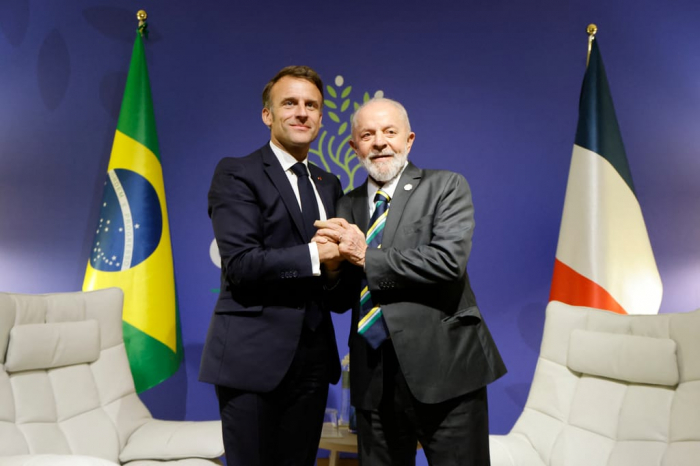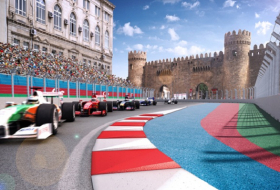The days when Emmanuel Macron could stop a trade deal with a text message might be over.
After a quarter of a century of on-off talks, an accord between the European Union and South America’s Mercosur bloc is once again within reach. And this time the French president, its strongest opponent, may have lost his de facto power of veto on trade after a string of political and electoral setbacks eroded his clout in Brussels.
Chief negotiators from both sides will meet again from Oct. 7-9 in Brasília to try and ready a deal in time for a mid-November G20 leaders’ summit in Rio de Janeiro. Host Luiz Inácio Lula da Silva of Brazil says he’s ready to sign, and European Commission President Ursula von der Leyen has been love-bombing Mercosur leaders to win them over.
The trade deal — which would create a market of 800 million people accounting for a fifth of global GDP and lift tariffs on goods ranging from beef to cars — is a top priority for von der Leyen and her home country, Germany.
But it has faced resolute resistance from Macron, under pressure from farmers and a skeptical public that have punished him repeatedly at the polls this year. If anything, his new right-leaning government, led by Prime Minister Michel Barnier, is more adamantly opposed than its predecessors.
“I’m in favour of any deal that looks fair,” Macron said at a speaking engagement in Berlin on Wednesday. Asked if he thought the Mercosur accord looked fair, Macron said: “No.”
Macron railed that a deal would expose heavily regulated EU industry and agriculture “to economies totally dis-aligned with this regulation.”
Von der Leyen unchained
Rewind nine months, and it was a different story.
In January, Mercosur negotiations were nearing the finish line but von der Leyen still needed Macron’s support to secure a second term as Commission chief. The text message in question, sources told POLITICO at the time, was enough to stall the talks.
Now the balance of power has reversed.
Macron has lost influence in Brussels following defeats in European and national elections, while Barnier’s government faces an immediate challenge to rein in the public debt and could be toppled by Marine Le Pen of the far right at any time.
The freshly-reappointed von der Leyen is, meanwhile, stronger than ever. And she wants to seal the deal.
“Having been re-confirmed, the president of the Commission thinks she has a free hand to speed up the negotiation and conclusion of the agreement with Mercosur despite opposition from France and other countries,” said Marie-Pierre Vedrenne, a French MEP from Macron’s centrist camp, denouncing the accord as part of von der Leyen’s “German to-do list.”
“She is wrong, as a large part of public opinion in Europe is against this agreement,” said Vedrenne, who sits on the European Parliament’s trade committee.
Majority view
A larger part of opinion among EU governments is, however, in favor of the deal. That could prove decisive as, if the deal is structured in a certain way, a supermajority could override the objections of a small, French-led minority.
In addition to Germany, von der Leyen can count on the support of 10 other EU countries that have jointly urged Brussels to speed up negotiations.
Benjamin Haddad, France’s new junior minister for Europe, told POLITICO that France was “working to create coalitions” against the deal as it stands. “We will oppose any agreement that does not respect these standards and clauses that are fundamental to the integrity of the EU,” he said.
Paris earlier succeeded in pushing the European Commission into proposing an addendum to the deal setting strict green commitments, including on deforestation and on respecting the Paris climate agreement.
What France can do
For an issue as politically toxic as the Mercosur agreement, Brussels would prefer to have a big country like France on board.
“It might be an unpopular move [for the Commission] to adopt a decision on a highly contentious issue without strong support,” said Geraldo Vidigal, a Brazilian professor in international trade law at the University of Amsterdam.
“France is very good at being on the driving seat of EU policy,” he said, pointing to the fact that Paris has rarely been outvoted at EU level since 2010.
But Brussels, which leads trade negotiations on behalf of the EU, also has the power to complete negotiations and shake hands on a deal — even in the face of French opposition.
For a few years now, the Commission has sliced and diced deals in a way that makes it possible to accelerate the approval of their core trade aspects.
These could be approved by the European Parliament and a qualified majority of at least 15 member countries representing 65 percent of the EU population. Only — less contentious — sections relating to political cooperation and investment would need to go through national parliaments.
The legal structure of the deal will be on the negotiators’ agenda in Brasília, and it’s likely that the two sides will prefer this architecture in a bid to accelerate the process.
Speaking privately, some French officials are coming to terms with the fact that Paris lacks the allies it needs to stop the deal. A plurality of EU nations sees it as a chance to reverse a loss of influence in South America to China, and improve access to strategic raw materials needed to complete the green tech transition.
“France would have to find at least three other EU Member States to vote against, all together representing at least 35 percent of the EU population,” explained Vidigal, noting that Ireland could be one of France’s very few allies.
Adding to Paris’ waning influence at EU level is news of a delay of the EU’s flagship anti-deforestation rules — a signature initiative from its presidency of the Council of the EU two years ago that is loathed in particular by Brazil.
Now, both Germany and the Commission see a golden opportunity to take advantage of France’s weakness and finally close the deal.
Negotiations “should now be concluded quickly,” Chancellor Olaf Scholz said after meeting Macron in Berlin on Wednesday. Addressing German exporters, he said: “We will do everything we can to ensure that this story has a happy ending.”
More about:















































